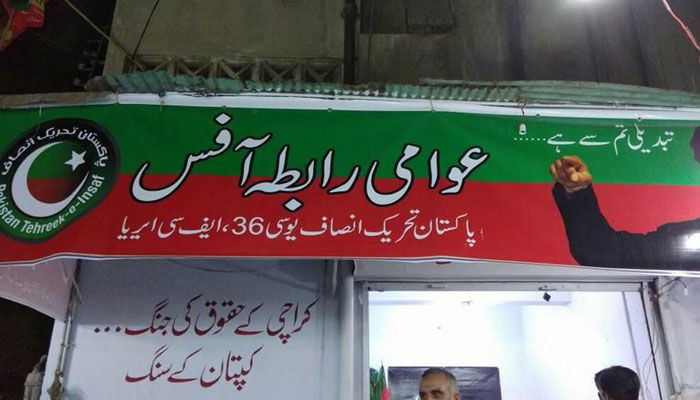PTI to register its offices in Karachi to prevent misuse
In the city that has seen a fair share of political parties in encroachments and other crimes, the Pakistan Tehreek-e-Insaf (PTI) has decided to register all of its offices in Karachi in order to ensure that they are not used for any illegal activity.
The PTI Karachi cabinet has directed all their district leaders that all the offices that are opened under the banner of the PTI or the names of its elected parliamentarians and local government representatives should register themselves with the party’s Karachi office by February 15, after which the offices that would not be registered would be shut down with the help of law enforcement agencies.
Confirming the party’s decision, Inayat Khattak, the PTI Karachi joint secretary, said that after the party assessed the history of misuse of political offices by other political groups in the past, it decided to regulate all its offices across the city.
“Registering the offices is part of the PTI’s policy to promote positive and constructive politics in the metropolis,” Khattak told The News. He said that after submitting the details of the offices, the party would check whether they were being used by the party legally or built on encroached land. “After the exercise, the party would have a computerised data of all offices operating in the city. It will not only help the party in the upcoming local government polls but also in maintaining law and order,” he said.
After the decision, the PTI’s district organisations have started to collect information about their offices across the city.
Salman Naqvi, the PTI District East information secretary, said the district leadership had notified all office-bearers and local leaders to submit details of their offices opened in various areas. “We have deputed district vice-president Imran Mughal to collect the information of the offices in the district,” Naqvi told The News.
A positive move
Analysts and security officials believe that it is a positive move to keep a weather eye on the offices of political parties popping up in a large number, particularly in suburban areas of cities.
During the Karachi operation since September 2013, law enforcement agencies had raided offices of political and religious parties in various neighbourhoods, arrested their members for their alleged involvement in violence and claimed to have seized weapons from there.
In a report that the Sindh Rangers submitted in the Senate in September 2014, the paramilitary force stated that it had conducted 372 raids at the Muttahida Qaumi Movement-Pakistan’s offices, 18 at the Awami National Party’s offices and 296 at the People’s Aman Committee’s offices during a year.
Police officers welcomed the PTI Karachi’s move and said that political and religious parties had used their offices for violent activities in the past and also stored weapons there.
“Much has changed in the last five years,” a senior police officer told The News. “But now, we have increasingly been receiving complaints that members of land mafia have been using offices of political parties to grab flats in residential projects and a portion of land in the city’s suburban areas.” He said criminal elements used offices and flags of political parties for their illicit businesses in the city.
-
 King Hospitalized In Spain, Royal Family Confirms
King Hospitalized In Spain, Royal Family Confirms -
 Japan Launches AI Robot Monk To Offer Spiritual Guidance
Japan Launches AI Robot Monk To Offer Spiritual Guidance -
 Japan Plans Missile Deployment Near Taiwan By 2031 Amid Growing Regional Tensions
Japan Plans Missile Deployment Near Taiwan By 2031 Amid Growing Regional Tensions -
 Meghan Markle, Prince Harry Spark Reactions With Latest Announcement
Meghan Markle, Prince Harry Spark Reactions With Latest Announcement -
 Kate Hudson Reflects On Handling Award Season With No Expectations
Kate Hudson Reflects On Handling Award Season With No Expectations -
 6 Celebrities Who Have Been Vocal About Anxiety And 'panic Attacks'
6 Celebrities Who Have Been Vocal About Anxiety And 'panic Attacks' -
 Is This The Future Of Train Travel? Robot Dogs, Drones Are Redefining Public Transit Safety Through China’s New Metro Station Deployment
Is This The Future Of Train Travel? Robot Dogs, Drones Are Redefining Public Transit Safety Through China’s New Metro Station Deployment -
 Sarah Ferguson Seeks Hollywood Backing As Epstein Files Resurface
Sarah Ferguson Seeks Hollywood Backing As Epstein Files Resurface -
 China’s AI Milestone: ByteDance’s Doubao Chatbot Hits 100M Users During Lunar New Year
China’s AI Milestone: ByteDance’s Doubao Chatbot Hits 100M Users During Lunar New Year -
 Think You Know ChatGPT? Here Are 5 AI Levels You’ve Never Seen
Think You Know ChatGPT? Here Are 5 AI Levels You’ve Never Seen -
 Bitcoin Bounces From $62,000 As On-chain Metrics Signal Prolonged Weakness: Here Is Everything To Know
Bitcoin Bounces From $62,000 As On-chain Metrics Signal Prolonged Weakness: Here Is Everything To Know -
 Elon Musk Teases Official Grok CLI For Developers As AI Rivalry With Anthropic Heats Up
Elon Musk Teases Official Grok CLI For Developers As AI Rivalry With Anthropic Heats Up -
 Jennifer Aniston Ready To Walk Down The Aisle Again?
Jennifer Aniston Ready To Walk Down The Aisle Again? -
 Sarah Ferguson’s Plan Now That Andrew Is Thrown Into The Fire: ‘She’s Not Certain She’ll Come Out The Other Side’
Sarah Ferguson’s Plan Now That Andrew Is Thrown Into The Fire: ‘She’s Not Certain She’ll Come Out The Other Side’ -
 ‘The AI Doc’: What AI Leaders Told Daniel Roher Will Keep You Up At Night
‘The AI Doc’: What AI Leaders Told Daniel Roher Will Keep You Up At Night -
 Sarah Ferguson In Hiding As Arrest Fears Grow After Andrew Was Taken Into Custody
Sarah Ferguson In Hiding As Arrest Fears Grow After Andrew Was Taken Into Custody




